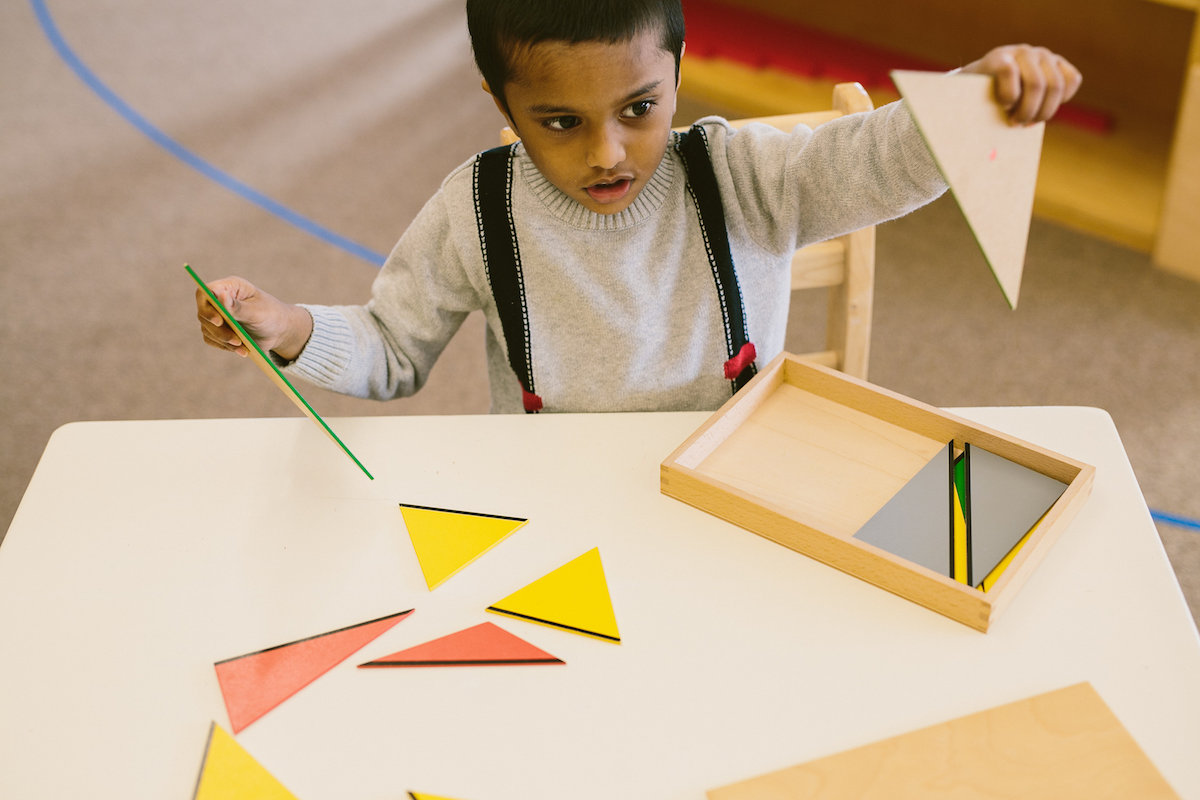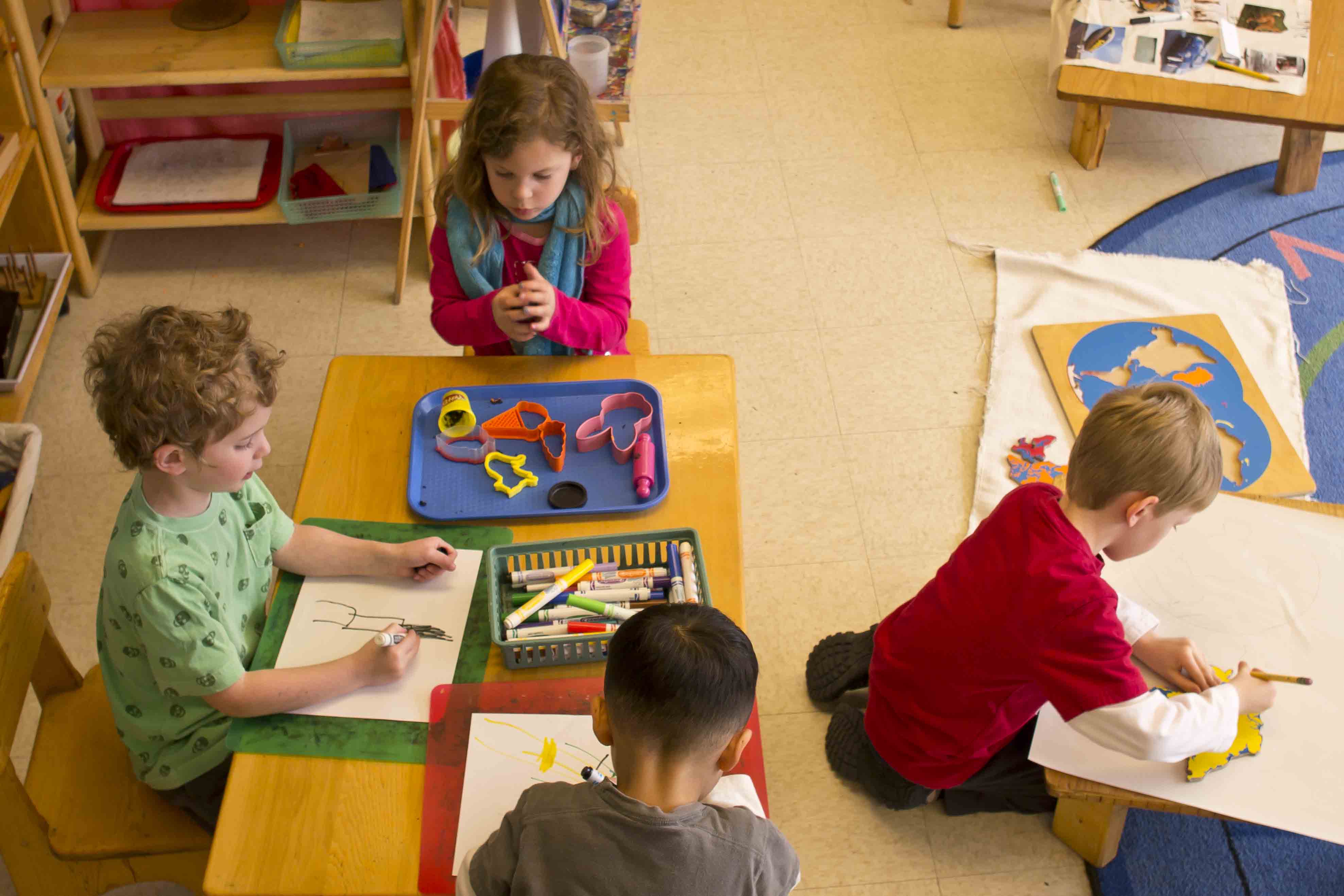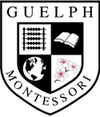- 8:00am - 05:30pm Mon - Fri
- +1(519) 836-3810
- 151 Waterloo Avenue, Guelph, ON.
Montessori

Montessori Basics
At the dawn of the twentieth century, Dr. Maria Montessori began her revolutionary work with impoverished children in Rome, Italy. As a result of Dr. Montessori's keen observation of the children as well as her background in medicine and psychology, she quickly recognized that the key formative years are those between birth and the age of six.
The Absorbent Mind: A Marvel of Learning
Dr. Montessori identified the absorbent mind, a remarkable phase before the age of six when children possess an unparalleled capacity for mental absorption. During these years, they effortlessly soak in language, master movement, internalize order, and explore their world through senses. This period, particularly in preschool, marks the zenith of these sensitivities, making learning both effortless and immensely enjoyable.
Dr. Montessori's Transformative Impact
Under Dr. Montessori's guidance, initially timid and overlooked children blossomed. They not only acquired essential academic skills such as reading, writing, and arithmetic but also exhibited newfound confidence, sociability, and self-discipline. Respect for self, others, and their environment became inherent qualities, leading to a profound transformation.
Montessori Worldwide: A Testament to Success
Dr. Montessori's achievements reverberated across Europe, capturing widespread attention. Today, Montessori education thrives globally, offering a comprehensive alternative to public systems. In countries like the Netherlands, Montessori education spans from preschool to college, demonstrating its enduring effectiveness.
A Foundation for Life
Experts emphasize the monumental impact of early childhood on lifelong development. Montessori has earned immense popularity among discerning parents who seek more than mere education for their children; they desire a robust life foundation. Through Montessori, children don't just learn; they flourish, embracing life with confidence, curiosity, and respect - embodying Dr. Montessori's enduring legacy.
Who is Dr. MARIA MONTESSORI?
Dr. Maria Montessori (1870-1952) was an Italian physician, anthropologist, psychologist, educator, and innovator, renowned for her groundbreaking contributions to early childhood education. Born in Chiaravalle, Italy, Montessori defied societal norms by pursuing a medical degree, becoming one of the first female physicians in Italy in 1896. Her keen observations of children with learning disabilities led her to develop pioneering teaching methods that emphasized individualized, child-centred learning.
In 1907, Montessori opened her first Casa dei Bambini, or "Children's House," in a disadvantaged neighbourhood in Rome. Here, she introduced her revolutionary educational approach, emphasizing independence, self-directed learning, and the development of practical life skills. Montessori's methods quickly gained international recognition, and her educational philosophy spread globally.
Throughout her life, Montessori continued to refine her educational theories, advocating for an environment where children could learn at their own pace, explore their interests, and develop a strong sense of self. She emphasized the importance of nurturing a child's natural curiosity and creativity, believing that education should be a tool for fostering peace and understanding in the world.
Montessori's legacy endures through the Montessori method, which is practiced in schools worldwide, spanning across age groups and cultures. Her innovative approach to education has inspired generations of teachers, parents, and researchers, shaping the way society perceives and educates its youngest members. Dr. Maria Montessori's profound impact on the field of education continues to influence educational practices and philosophy around the globe.
Montessori
The Montessori Method
The Montessori Method is designed to nurture a child's unique development and foster individual growth in three key areas: physical abilities, intellectual capacities, and psychological well-being. Driven by the philosophy that children learn at their own pace and motivation, our carefully prepared environment embodies principles of beauty, order, and concrete reality.
Sensory Exploration and Active Learning
Dr. Montessori observed that children experience sensitive stages where they are exceptionally receptive to specific skills. Emphasizing the crucial ages of two to six, we focus on developing senses through hands-on experiences - seeing, touching, hearing, feeling, and moving. Our materials are thoughtfully designed to engage these senses, promoting active learning and skill mastery.

Empowering Through Self-Directed Education
In our Montessori environment, children engage in individual, spontaneous activities that align with their sensitivities and interests. Scientifically selected materials enhance concentration and self-discipline, transforming education into an active, self-driven process. While most of our school day emphasizes individual or small group learning, we also value community, with group activities like singing, storytelling, and movement sessions fostering social growth.
Cultivating a Lifelong Love for Learning
TUnlike traditional education, Montessori does not aim to inundate children with predetermined facts. Instead, we harness their innate tools for learning—the senses, the hands, and the intellect. Through our guidance, children refine these tools, fostering self-discipline and independence. The ultimate goal is to instill a robust character and a lifelong passion for learning that will endure throughout their lives.
